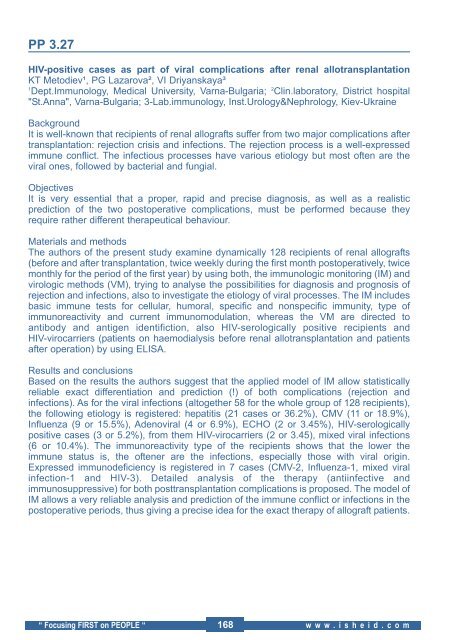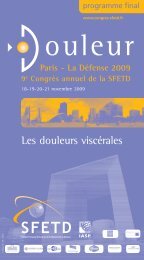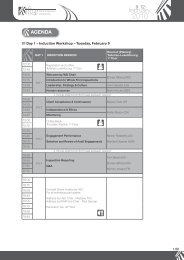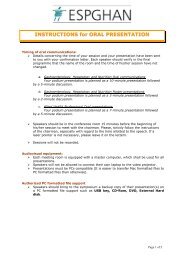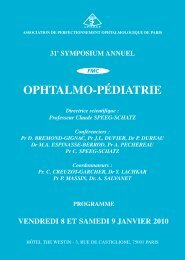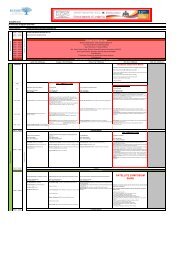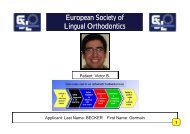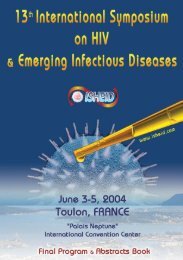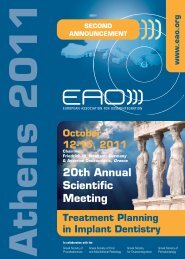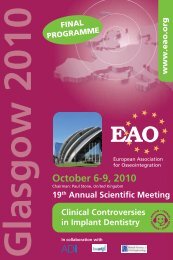final program.qxd - Parallels Plesk Panel
final program.qxd - Parallels Plesk Panel
final program.qxd - Parallels Plesk Panel
You also want an ePaper? Increase the reach of your titles
YUMPU automatically turns print PDFs into web optimized ePapers that Google loves.
PP 3.27<br />
HIV-positive cases as part of viral complications after renal allotransplantation<br />
KT Metodiev¹, PG Lazarova², VI Driyanskaya³<br />
1<br />
Dept.Immunology, Medical University, Varna-Bulgaria; 2 Clin.laboratory, District hospital<br />
"St.Anna", Varna-Bulgaria; 3-Lab.immunology, Inst.Urology&Nephrology, Kiev-Ukraine<br />
Background<br />
It is well-known that recipients of renal allografts suffer from two major complications after<br />
transplantation: rejection crisis and infections. The rejection process is a well-expressed<br />
immune conflict. The infectious processes have various etiology but most often are the<br />
viral ones, followed by bacterial and fungial.<br />
Objectives<br />
It is very essential that a proper, rapid and precise diagnosis, as well as a realistic<br />
prediction of the two postoperative complications, must be performed because they<br />
require rather different therapeutical behaviour.<br />
Materials and methods<br />
The authors of the present study examine dynamically 128 recipients of renal allografts<br />
(before and after transplantation, twice weekly during the first month postoperatively, twice<br />
monthly for the period of the first year) by using both, the immunologic monitoring (IM) and<br />
virologic methods (VM), trying to analyse the possibilities for diagnosis and prognosis of<br />
rejection and infections, also to investigate the etiology of viral processes. The IM includes<br />
basic immune tests for cellular, humoral, specific and nonspecific immunity, type of<br />
immunoreactivity and current immunomodulation, whereas the VM are directed to<br />
antibody and antigen identifiction, also HIV-serologically positive recipients and<br />
HIV-virocarriers (patients on haemodialysis before renal allotransplantation and patients<br />
after operation) by using ELISA.<br />
Results and conclusions<br />
Based on the results the authors suggest that the applied model of IM allow statistically<br />
reliable exact differentiation and prediction (!) of both complications (rejection and<br />
infections). As for the viral infections (altogether 58 for the whole group of 128 recipients),<br />
the following etiology is registered: hepatitis (21 cases or 36.2%), CMV (11 or 18.9%),<br />
Influenza (9 or 15.5%), Adenoviral (4 or 6.9%), ECHO (2 or 3.45%), HIV-serologically<br />
positive cases (3 or 5.2%), from them HIV-virocarriers (2 or 3.45), mixed viral infections<br />
(6 or 10.4%). The immunoreactivity type of the recipients shows that the lower the<br />
immune status is, the oftener are the infections, especially those with viral origin.<br />
Expressed immunodeficiency is registered in 7 cases (CMV-2, Influenza-1, mixed viral<br />
infection-1 and HIV-3). Detailed analysis of the therapy (antiinfective and<br />
immunosuppressive) for both posttransplantation complications is proposed. The model of<br />
IM allows a very reliable analysis and prediction of the immune conflict or infections in the<br />
postoperative periods, thus giving a precise idea for the exact therapy of allograft patients.<br />
“ Focusing FIRST on PEOPLE “ 168 w w w . i s h e i d . c o m


